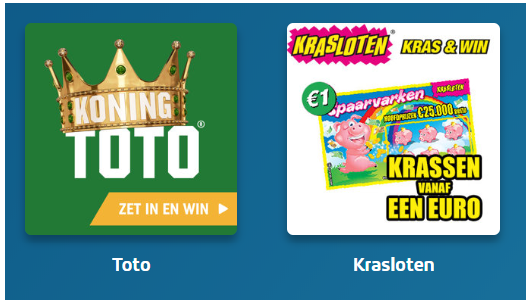
In 2017, Nederlandse Loterij (the national lottery and sports betting operator in the Netherlands) decided to change from a primarily single-vendor software solution to a best-of-breed landscape, in which the different aspects of their business are supported by systems from multiple vendors.
This resulted in more flexibility and enables the organisation to adapt more rapidly to the changing requirements and future possibilities in the Dutch market for online betting and gaming.
This decision, however, presents a challenge in terms of integrating these different back-end systems and Nederlandse Loterij’s’s different clients (game-specific websites and mobile apps, customer services, in-lane solutions, etc.) in a way that ensures the overall platform is robust, scalable and resilient to changes in individual systems.

Nederlandse Loterij was looking for a technology partner in order to meet the new challenges it is facing to be future-proof. It needed a company that can provide a gateway that integrates the various systems while offering consistent APIs, domain abstractions and orchestration between services.
Nederlandse Loterij selected Trifork and Utilus to build the gateway as joint partners. Why did it not choose an off-the-shelf integration product instead? What solution is Trifork providing? See below.

Trifork has a proven track record in delivering working software for mission-critical systems, which often feature extensive integrations with third-party systems to exchange data.
These integrations must be robust when facing temporary unavailability of external systems and provide alerting, throttling to prevent overloading systems with requests, lenient handling of various data exchange formats, etc.
After Trifork explained and demonstrated how it has architected and implemented several of these systems, Nederlandse Loterij concluded that a custom-built integration solution tailored to their exact needs would be a better solution than product-based solutions from other vendors using traditional Enterprise Service Buses (ESBs).
These other solutions have architectural limitations such as requiring all integration logic to be incorporated into a centrally-operated system that often becomes a huge bottleneck.
ESB-based solutions also tend to focus on the limitations of what the product provides, rather than on what optimally fulfils the client’s requirements. Trifork builds custom software solutions based on proven, widely used Open Source software. This gives clients the best of both worlds: quick development without vendor lock-in and tailor-made functionality that best addresses their needs.
Utilus is providing the setup of the AWS environment in which the system is running: both the infrastructure development as well as the day-to-day operations. This setup follows a cloud-native infrastructure-as-software approach, whereby environments can be stood up quickly, reliably and in a reproducible manner, and scalability and observability of the system are treated as first-class citizens. This ensures that systems are run as stable and efficiently as possible.

Trifork strongly believes in applying agile practices in all its projects. This means Trifork doesn’t carry out fixed-time, fixed-price projects. Requirements are never completely and fully clear and understood in detail when commencing a custom software project.
In light of the complex nature of this project, Nederlandse Loterij was looking for a provider with both the necessary technical expertise and the ability to assist in gathering requirements, performing analysis and aligning the other providers within their IT landscape.
Trifork’s team is working closely with Nederlandse Loterij’s stakeholders to drive the overall solution forward. When necessary, the team is happy to spend more time on analysis than coding for some functionality. The stakeholders are welcome to change their minds along the way and do not have to worry about what is in or out of scope of the contract. This means they can always be sure that Trifork is working on the aspects that add the most value to their business at any given time.

Trifork and Utilus are building a gateway that is based on a cloud-native architecture. A suite of microservices is deployed to Amazon Web Services (AWS), using AWS’s Docker orchestration support.
This infrastructure is completely configured through software. As a result, new environments can be stood up and updated quickly and reliably without manual steps. Built pipelines ensure that deploying a new release to every environment can be performed with a single click.
Services responsible for different parts of the domain are completely independent. This means a problem with a game-specific back-end will never affect other services. What’s more, changes in back-end systems only require updates of the adaptor services that expose them to the rest of the gateway without causing a ripple effect. This ensures that clients are decoupled from back-end implementation details through a Nederlandse Loterij-specific rather than vendor-specific domain model.
Centralised logging, tracing, metrics and alerting provide insight into how the entire system operates. Thanks to the gateway’s nature, this makes it possible to observe the gateway itself, the downstream systems it exposes and the clients that interact with it.
These insights provide Nederlandse Loterij with valuable information on usage, availability, performance and error rates and how these factors affect their bottom line with respect to selling their products to their customers.
By applying distributed system patterns and best practices such as circuit breakers and bulkheading, the gateway ensures that access to back-end systems occurs in a controlled manner whereby we can throttle the load we put on downstream systems, detect failures early and provide retries and fallbacks to degrade gracefully.
In 2019 Trifork started a second project for the Nederlandse Loterij: to build a new subscriptions backend, responsible for collections, billing and provisioning of tickets for subscription-based players. This project is based on the same principles and was started when Nederlandse Loterij realized that their requirements for a new subscriptions system couldn’t be met by off-the-shelf solutions.

Over the last three years, the Gateway has helped the migration to the new central lottery system by providing its own APIs, which mostly remained unchanged while the new system was rolled out for each game. In this process, the Gateway assumed many new responsibilities, like orchestrating calls between the player account management system and the central system and exposing all player-related operations. This way, clients like web sites, mobile apps and in-lane solutions were able to use the new backends with minimum effort, leaving all the implementation details to the Gateway.
In 2020 the new subscriptions system that Trifork built was put into production for the first games, ensuring business continuity as games were brought onto the new platform. In the first half of 2021 the final game, the Staatsloterij (State Lottery), by far the biggest and most complex game, was brought live on the platform, completing the original project.
Meanwhile, new legislation will allow the Nederlandse Loterij to offer new forms of sports betting and casino games under strict regulations in the second half of 2021. These regulations require all sorts of responsible gaming checks during signup, when making wallet deposits and while playing, like checking for politically exposed people, performing device checks, checking government registries, etc.
The Gateway is ideally positioned to integrate all these different systems for these new business flows, ensuring that Nederlandse Loterij will be fully ready to acquire its license once the new legislation takes effect. The gateway has thus become the heart of Nederlandse Loterij’s IT platform.

With annual revenues of €1.3 billion, Nederlandse Loterij is the largest lottery and gaming organization in the Netherlands with a significant impact on Dutch society. Nederlandse Loterij offers traditional lottery games, sports betting and instant games. It offers attractive, regulated games of chance to Dutch players.
Every year, Nederlandse Loterij gives almost all of its profits to the Dutch sporting community via the organisation NOC*NSF. These funds support 18 good causes in the field of health, exercise and welfare. In addition, proceeds are also given to the larger Dutch society via the Ministry of Finance.

Content